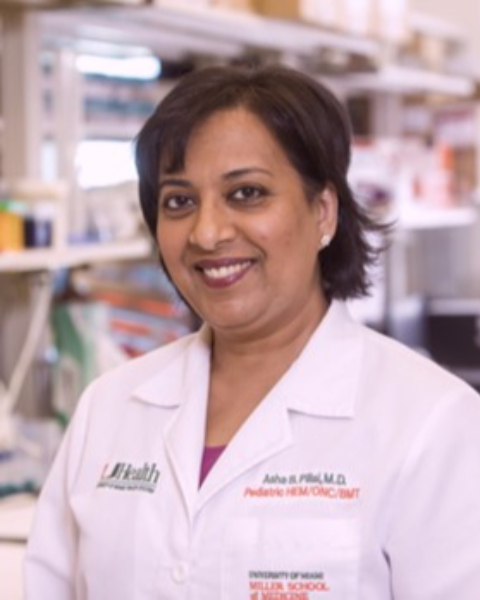
Asha B. Pillai, MD
Chair, Hematology and Transplantation, Global Development Scientific Council
Regeneron Therapeutics Inc
Tarrytown, New York, United States
Dr. Pillai completed a B.S. summa cum laude in Microbiology and Immunology at Stanford, with Research Honors for her work in the laboratory of Alan Krensky and Carol Clayberger. She then pursued physician scientist training and completed a residency in Pediatrics and Internal Medicine at Baylor, returning to Stanford for a dual fellowship in Medical Hematology/BMT & Pediatric Hematology/Oncology/BMT. She completed an Advanced Research Felllowship in BMT Immunology at Stanford in the laboratory of Sam Strober, funded by the Ruth Kirschstein NRSA and transitioning to a K08 Career Development Award from the NHLBI. At Stanford, her work was the first to define a critical role for murine and human iNKT cells in separating GVHD from graft-versus-leukemia (GVL) effect after allogeneic BMT, and her independent original work established a key innate-adaptive immune regulatory axis as a pathway allowing MHC-mismatched allo-transplantation tolerance for both hematopoietic stem cell transplantation (HSCT) and solid organ transplantation (SOT).
She established her research laboratory in the Department of BMT and Cellular Therapy at St. Jude Children’s Research Hospital, where her group developed robust preclinical models allowing the development of haploidentical transplantation conditioning protocols in children which preserved GVL effect while protecting from GVHD. These served as the basis for several parent child HSCT protocols for malignancies through the BMT Clinical Trials Network (BMT-CTN) and Pediatric Blood and Marrow Transplant Consortium (PBMTC). Her group’s research focus in the past decade has been on preclinically developing novel innate immune tolerance strategies to cure hemoglobinopathies, aplastic anemia, and other non-malignant hematologic conditions. Her research group’s evolving interests have led them to explore, in parallel, the role of invariant natural killer T cells to optimize peri-transplant innate cellular immunotherapy to optimally target solid tumors in children and adults. This work has been continuously funded by NIH R awards and by other national agencies including the V Foundation for Cancer Research, Children’s Cancer Research Fund Innovation Award, etc. She is a member of several advisory committees and editorial boards including the Medical Advisory Board of the Asian American Donor Program (AADP) and editorial boards of Science Immunology, Transplantation and Cellular Therapy (formerly Biology of Blood and Marrow Transplantation), Frontiers in Transplantation, and Frontiers in Immunology. She joined Regeneron in September 2022 as Chair in Hematology, Hematologic Malignancies, and Transplantation on the Global Development Scientific Council, where she continues to actively review and innovate basic and clinical research in immunotherapy and transplantation. She is a standing member of the NIH Transplantation, Tolerance and Tumor Immunology (TTT) Study Section and serves on various federal and national grant review panels, foundations, and scientific councils in the US, UK, and Europe.
Since 2007, Dr. Pillai’s research efforts have supported the research training of tens of graduate students and post-doctoral fellows, several funded by the NIH and other national agencies who now serve as scientists in academic and industry. She developed the first FOCIS Advanced Course in Basic and Translational Immunology in Asia (Jaipur, India, 2019) and has served on the Educational Committee of FOCIS since 2019. She serves as course Co-Director for CII since February of 2023.
Disclosure information not submitted.
Presentation(s):
-
Cancer Immunity & Immunotherapy Course
Tuesday, June 20, 2023
7:30 AM - 5:45 PM

